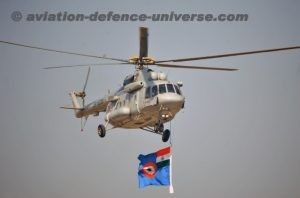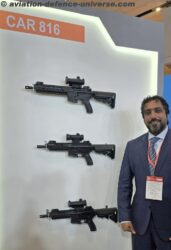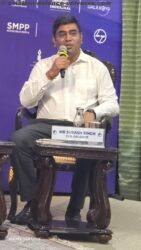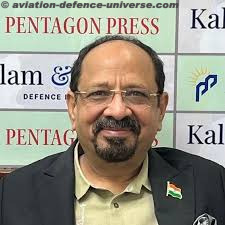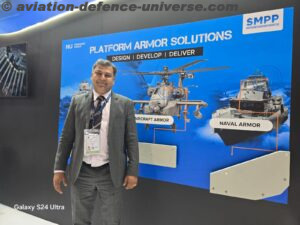
New Delhi. 06 October 2020. “India is a world leader in data science and our Indian employees are helping shape the future of our products. When I talk about driving innovation in Indian aerospace, I’m also talking about India driving innovation in all of aerospace,” said Michael Koch, VP, Boeing Defence, Space & Security, India in and exclusive interview with Aviation & Defence Universe (ADU).
ADU. What is the update on the MRFA? What kind of engagement do you have with the stakeholders in India?
MK. We have responded to the Indian Air Force’s Request for Information (RFI) for the 114 MRFA. We are in conversations with them on the full spectrum of offerings we bring to the table. The IAF’s Expression of Interest (EOI) and Request for Proposal (RFP) detailing their requirements are not out. While awaiting further definition on the Indian Air Force’s requirements, we have requested a license for the F-15EX so that we’re ready to share all potential solutions across our fighter portfolio when appropriate.
ADU. MRFA apart, what other future opportunities do you see with the Indian military, across domains?
MK. Boeing has been working with India’s defence forces for many years now, supporting their mission-readiness and modernization objectives. Our portfolio of products and services offer unmatched operational capabilities across the entire mission spectrum.
In addition to our response to IAF’s RFI for the 114 MRFA, Boeing’s F/A-18 Block III Super Hornet will offer unique and differentiated advantages to the Indian Navy. The F/A-18 Block III Super Hornet will offer unrivalled growth potential to the Indian Navy through single and two-seat carrier compatible variants and the ability to interface with the P-8I as a force multiplier. It will also augment the collaboration between the U.S. Navy and Indian Navy in the Indian Ocean region.
Earlier this year, the Ministry of Defence signed the contract for the acquisition of an additional six Apaches for the Indian Army. We’re also having discussions with IAF on their tanker requirements.
We are seeing the growth of our services business and the value Boeing is able to provide through the lifecycle of its products. We are working with the IAF and the IN to provide exceptional operational capability and readiness for the P-8Is, the C-17s and the Head of State aircraft through sustenance contracts and the Chinooks and Apaches through warranty.
The recent developments in India’s space arena that allows the private sector to carry out space activities like building rockets, satellites and providing launch services is positive. We look forward to partnering with ISRO in their endeavours.
ADU. Have you had any conversation on F/A-18 Block III Super Hornet with the Indian Navy?
MK. We continue to engage with the Indian Navy on their requirements and have responded to the RFI for the Multi-role Carrier Borne Fighters program. The F/A-18 Block III Super Hornet, the frontline fighter of the U.S Navy is on offer to the Indian Navy. It will offer most contemporary warfighting capabilities to the Indian Navy while enhancing cooperation between the Indian Navy & U.S Navy.
ADU. Boeing MoU with HAL and Mahindra Defence Systems in 2018 has been hailed as a model for public private partnership. How do you view it now and what is the roadmap for future?
MK. We continue to work with our partners in refining our Make in India strategies to provide the most compelling industrial solution. As the manufacturing requirements for the IN MRCBF and IAF MRFA competition are finalized, Boeing and our partners will decide the path forward.
ADU. What is the update on the additional P-8Is for the Indian Navy?
MK. India is the net security provider across the Indian Ocean region and the P-8I is unique in its ability to address the entire mission portfolio – the requirement is larger than the current aircraft on contract. The Indian Navy’s P-8Is have set new records for aircraft utilisation and productivity. The first of the four options aircraft will be delivered this year, and the remaining three in 2021.
ADU. By when will the Indian Army receive the Apache Helicopters?
MK. The AH-64 Apache helicopters will be a force multiplier for the Army, just as it is today for the Indian Air Force. The Indian Army AH-64E Apaches are planned to deliver in country 48-49 months after contract award. As with all of our customers, we will continue to assess and communicate regularly with the Indian Army on any impacts due to Covid-19. Our Tata Boeing Aerospace Ltd joint venture in Hyderabad continues to be a critical source of Apache manufacturing for the US Army and customers worldwide.
ADU. Given government of India’s focus on indigenization and promoting defence exports, how can Boeing contribute? Can you talk about the capacity-building that you have done in India and intend to do in the future?
MK. Our commitment to India is for the long-term. We work closely with our suppliers in India to support supply chain health, identify new ways to drive innovation, and deliver greater value to our customers. Our large supplier base in India is growing to more than 200 suppliers and is globally competitive, with strong partnerships that are aligned with the government’s Aatmanirbhar Bharat vision.
Our installed platform base with commercial and defence customers in India and our expanding supplier base makes it an imperative for us invest in, develop, and nurture talent. Through our skilling and up-skilling initiatives, we are developing Indian MSMEs, and training hundreds of pilots, aircraft maintenance engineers, technicians, and frontline factory workers across India with our industry partners like Tata, Rossell Techsys, Jaivel and Lakshmi Machine Works. Our vision is to create a robust aerospace and defence ecosystem in India. Ultimately, we want to bring the best of Boeing to India, and the best of India to Boeing.
ADU. What innovation is happening in Boeing in terms of automation and intelligent equipment/platforms?
MK. Defence platforms and services are moving towards system-based approaches, utilizing digital and process automation to revolutionise how these products operate, and how they are designed and manufactured. This is happening in both the commercial and defence spaces, and we learn different innovations from each. For defence platforms, we are offering India fully-networked solutions and I believe this leapfrogging in capability is a key differentiator for the long-term. These aircraft are incredibly potent in their own right, but it is as nodes in a highly secured network that they win the fight or prevent the fight because the adversary knows they are overmatched.
But other than mission performance, digitization is even transforming how we maintain aircraft. We can harvest data to make real-time improvements in things like fuel efficiency, predictive maintenance and fatigue life. We then apply these insights to model-based designs to reduce the cost of our new aircraft while simultaneously extending their longevity.
ADU. Do you see a possibility of carrying out joint research in these areas with your Indian partner or through your engineering centres? Basically, what conditions must exist for Boeing to invest in new-tech research in India?
MK. The Boeing India Engineering & Technology Center (BIETC), with a strong presence in Bengaluru and Chennai, is leveraging a talented pool of employees to contribute to global aerospace and defence growth. Our engineers in India undertake high-quality, advanced aerospace work that supports areas as diverse as test and evaluation; development of advanced, environmentally friendly coatings; data analytics for next-generation airplane health management; innovation on Internet of Things and Digital Transformation; and development of software tools that enable airlines to improve their operations and work with airports to enable de-congestion and navigation at reduced costs. It may surprise your readers the extent to which our employees in India are contributing directly to the next generation of cutting edge aerospace solutions. We’ve just started to scratch the surface of what’s possible. As I said, for Boeing, India is unique and we have a very long-term commitment and view.






































